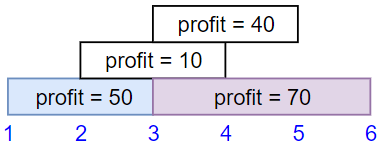Maximum Profit in Job Scheduling
We have n jobs, where every job is scheduled to be done from startTime[i] to endTime[i], obtaining a profit of profit[i].
You're given the startTime , endTime and profit arrays, you need to output the maximum profit you can take such that there are no 2 jobs in the subset with overlapping time range.
If you choose a job that ends at time X you will be able to start another job that starts at time X.
Example 1:

Input: startTime = [1,2,3,3], endTime = [3,4,5,6], profit = [50,10,40,70] Output: 120 Explanation: The subset chosen is the first and fourth job. Time range [1-3]+[3-6] , we get profit of 120 = 50 + 70.
Example 2:

Input: startTime = [1,2,3,4,6], endTime = [3,5,10,6,9], profit = [20,20,100,70,60] Output: 150 Explanation: The subset chosen is the first, fourth and fifth job. Profit obtained 150 = 20 + 70 + 60.
Example 3:

Input: startTime = [1,1,1], endTime = [2,3,4], profit = [5,6,4] Output: 6
Constraints:
- 1 <= startTime.length == endTime.length == profit.length <= 5 * 10^4
- 1 <= startTime[i] < endTime[i] <= 10^9
- 1 <= profit[i] <= 10^4
Solution:
class Solution {
public int jobScheduling(int[] startTime, int[] endTime, int[] profit) {
int n = startTime.length;
int[][] jobs = new int[n][3];
for (int i = 0; i < n; i ++) {
jobs[i] = new int[] {startTime[i], endTime[i], profit[i]};
}
Arrays.sort(jobs, (a, b) -> a[1] - b[1]);
// endTime -> profit
TreeMap<Integer, Integer> map = new TreeMap();
map.put(0, 0);
for (int i = 0; i < n; i ++) {
int[] curr = jobs[i];
int prevProfit = map.floorEntry(curr[0]).getValue();
if (prevProfit + curr[2] > map.lastEntry().getValue()) {
map.put(curr[1], prevProfit + curr[2]);
}
}
return map.lastEntry().getValue();
}
}